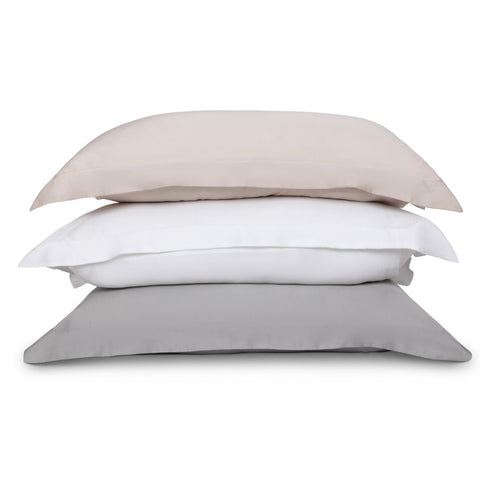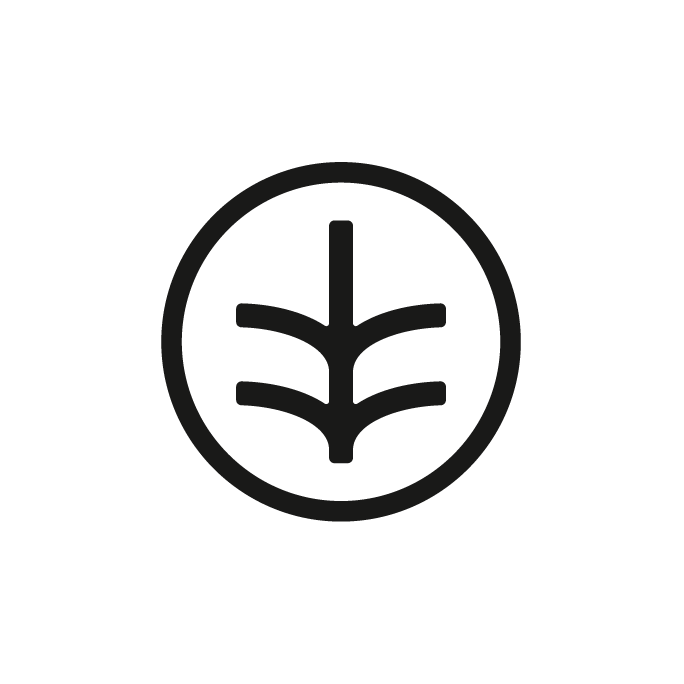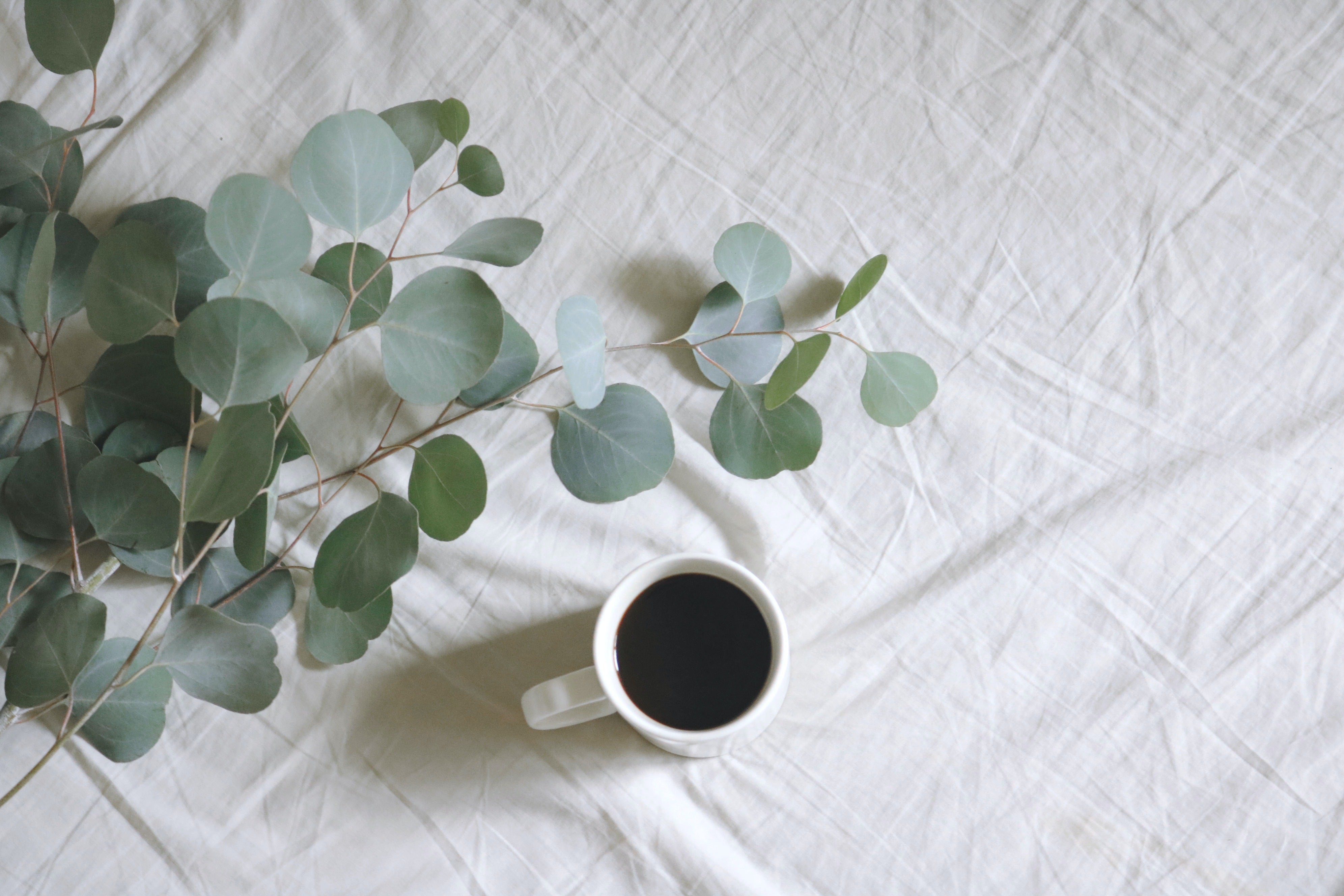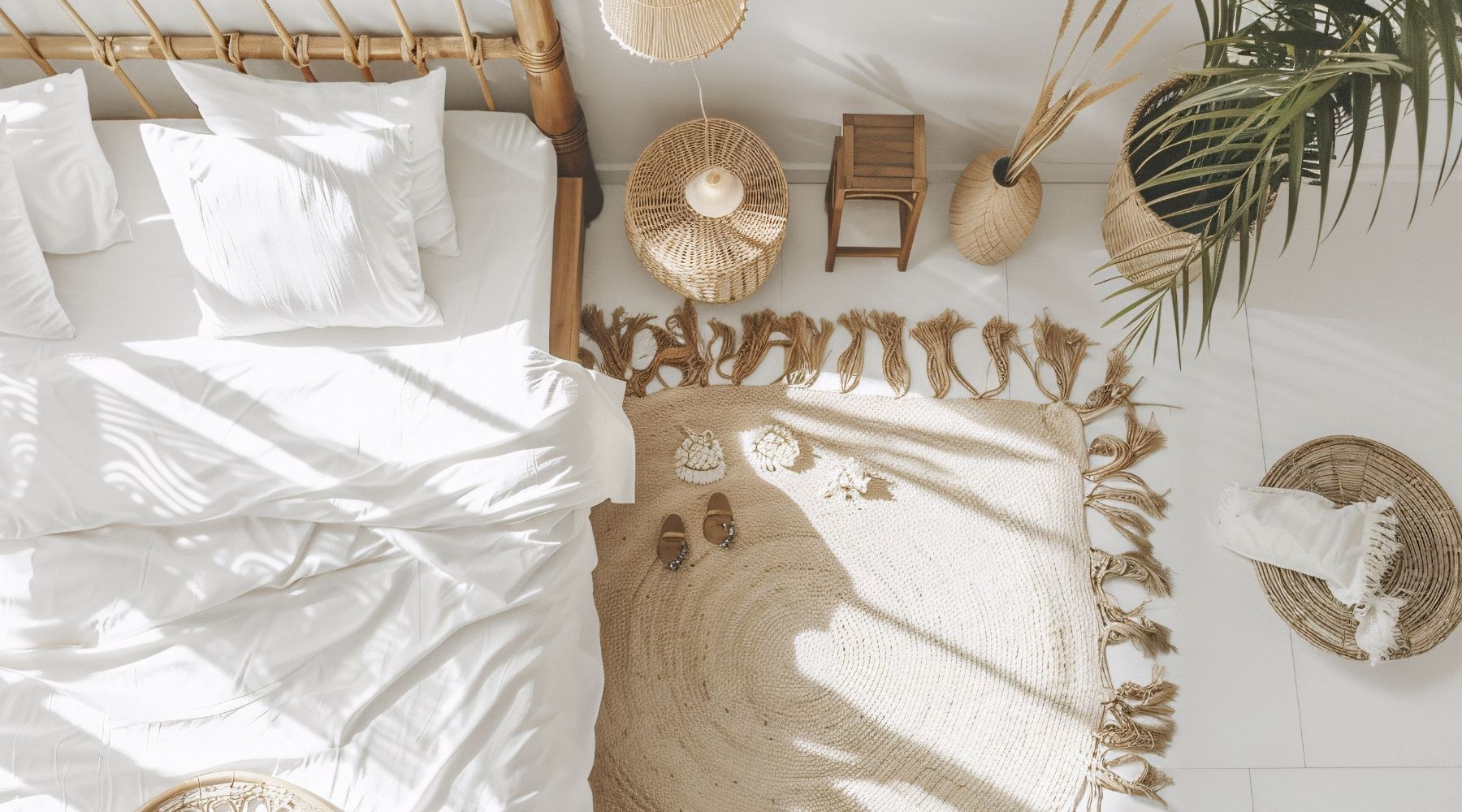Tencel is a versatile and practical fabric, sourced from the eucalyptus tree, and has become popular among Brits for its luxurious feel and chic appearance. But what exactly is Tencel, and what are its full list of benefits? In this guide, we’ve discussed all you need to know about lyocell Tencel fabric, including a side-by-side comparison to cotton bedding.
What is eucalyptus?

Before we look at what exactly Tencel fabric is, it’s important to understand a little about how it’s sourced. So, without further ado, what is Tencel fabric made of?
The eucalyptus plant (and it’s 700 variations) is native to Australia. The trees range in size from less than 10 meters to almost 100 meters tall, and make up around 75% of the trees in Australia’s forests. But what else is there to know about this popular plant?
- Eucalyptus is fast-growing and evergreen, which makes it completely sustainable and readily available throughout the year.
- Eucalyptus is an extremely durable and hardy plant which can survive high temperatures and periods of drought. It can even survive wildfires that sometimes sweep across Australia, with fire-resistant seeds that can quickly sprout and begin to regrow after a blaze.
- Thanks to its hardy properties and adaptability, eucalyptus plants are now also grown across the globe in southern Europe, South America and South East Asia.
- They’re in high demand, thanks to their various uses and fast growth, and are often cut at the base which allows it to regrow quickly.
- The most popular type of eucalyptus variation is called eucalyptus globulus, known locally as blue gum, and is the source of eucalyptus oil. The trees and leaves of the eucalyptus plant also have a notable minty scent, which is concentrated in the oil.
Both the dried leaves and the oil from eucalyptus plants are thought to have various uses and medicinal properties.
What are the uses of eucalyptus?
What makes eucalyptus so versatile is that every part of the eucalyptus plant has its uses and applications. We’ve broken down the properties of each and what they’re used for.
Leaves

The leaves of the eucalyptus tree are often dried and used as tea. They are packed full of antioxidants and flavonoids which protect the body against toxins.
Dried eucalyptus leaves are also often used as air fresheners, thanks to their minty scent. They add a touch of freshness to any environment and are an attractive room accessory.
Another popular use of eucalyptus leaves is to hang them up in the shower. The steam mixes with the liberated oils from the plant, to create a luxurious hot-water experience. The minty steam will also act as a decongestant and anti-inflammatory for any stuffy nose days.
Oil

Eucalyptus oil is obtained from the dried leaves of the plant, which are then crushed, and steam distilled, producing a clear oil. The oil contains the active ingredient 1-8 cineol, otherwise known as eucalyptol, which is very potent and must be diluted before use.
The majority of benefits and applications of eucalyptus oil include: aromatherapy, ointments, disinfectants, skin treatments and insect repellents.
Wood

The timber from eucalyptus trees is a popular material for construction. It is used as flooring, fencing, decking and more. Helpfully, its a strong and dense material that has decent resistance to termites.
Eucalyptus is extremely versatile, partly due to the large number and variety of species. The bark of the tree of some species is used in papermaking and tanning.
Perhaps surprisingly, the wood of eucalyptus trees can also be made into fabric. Eucalyptus wood is broken down into wood pulp, - and wood cellulose is extracted and turned into fibres. The fibres are then woven into a fabric called Tencel™.
Tencel™ is a strong, breathable and soft fabric that’s luxury is comparable to silk. It is also one of the most sustainable and eco-friendly textile material options available.
What are the health benefits of eucalyptus?
Among various practical properties, eucalyptus also has numerous health benefits, including combatting bacterial and viral infections and acting as an anti-inflammatory.
Antimicrobial
Eucalyptus has antimicrobial properties and can act against bacterial, viruses and fungi, and, as an essential oil, it can be burnt in an oil burner to kill airborne microbes. Otherwise, it is a common ingredient found in cleaning sprays and hand sanitizers.
The antimicrobial properties of eucalyptus have been known for many years, and there is even evidence of aborigines using eucalyptus to treat wounds and prevent infections. In fact, the application of eucalyptus as a disinfectant is still practiced today, with many healing creams and ointments containing the essential oil.
Cold Symptom Relief
Eucalyptus is a trusted source of relief from many cold and flu symptoms, and is an active ingredient in symptom relievers like cough lozenges and inhalants.
Eucalyptus oil can act an expectorant to thin mucus in the lungs, and is found in an active ingredient of popular ointments such as Vicks Vaporub, which can be applied to the chest.
Eucalyptus oil or an ointment containing it can also be added to boiling water to form vapour which can loosen mucus when inhaled, acting as a decongestant to clear sinuses.
Sore throats and coughs can also benefit from eucalyptus, and it has been used as a cough suppressant for many years in numerous over-the-counter medicines. Additionally, a sore throat can be relieved by gargling hot eucalyptus tea.
Dental Care
The antibacterial properties of eucalyptus make it an effective ingredient in mouthwashes, toothpastes and dental preparations. Eucalyptus can fight the bacteria in the mouth that’s responsible for bad breath, plaque build-up and tooth decay.
Not only will this protect teeth and gums, but the use of eucalyptus in dental products can also result in fresh, minty breath! .
Insect Repellent
Eucalyptus is officially recognised as a successful insecticide. The oils of eucalyptus globulus and lemon eucalyptus in particular are often found in insect repellents and insecticides.
They are effective at killing mites, ticks and deterring mosquitoes and houseflies, and since eucalyptus is a natural product, it’s provides a safe, chemical free method of combatting insects.
Pain Relief
There is some evidence that eucalyptus oil can be effective in relieving mild pain, with many over-the-counter creams for pain containing extracts of the versatile plant.
One way it can reduce pain is by acting as an anti-inflammatory; when present in a cream or ointment, eucalyptus oil can help with conditions such as arthritis, by reducing inflammation of joints. Additionally, the anti-inflammatory properties are known to ease the pain of cold sores.
Its analgesic properties (ability to relieve pain) have also been shown to help with muscle and joint discomfort, as well as bruising, strains, sprains and aches.

Dry Skin
Eucalyptus oil is frequently found in skin creams and treatments, as it’s effective in combatting dry skin by increasing the prevalence of fatty acids known as ceramides. This helps skin stay moisturised, and reduces the likelihood of eczema and other skin disorders like psoriasis ad dermatitis.

Is eucalyptus sustainable?
Eucalyptus has many sustainable properties that makes it an exciting material for an eco-friendlier future.
It grows quickly and can easily be replenished. This means that that less land is needed to keep planting more eucalyptus, as the original land and plants can be continually reused.
Additionally, eucalyptus can grow into strong, healthy trees without the need for pesticides and herbicides. Pesticides are a huge problem for local environments, as they contaminate ecosystems and cause substantial damage. Growing eucalyptus will not affect the surrounding ecosystems.
What is Tencel fabric?
Soft and silky, Tencel is a popular bedding fabric among Brits looking for luxury. But there are three types of Tencel to be aware of: lyocell, model, and branded fibres.
Lyocell fibre
Lyocell is the most common type of Tencel fabric found in bedding. Its fibres are versatile threads that can easily be combined with other textile materials, including cotton, wool, and silk, to enhance their quality and aesthetic. Lyocell is known for its strength, outstanding moisture-wicking properties, and silky softness on the skin.

Shop Ethical Bedding's Eucalyptus Silk pillowcases
Modal fibre
Modal fibres are exceptionally soft to touch, and are often blended with other textiles to enhance comfort. The main difference between Modal and Lyocell fibres are that the former typically has thinner threads, which makes them perfect for apparel. Flexible and versatile, Modal Tencel provides almost-unlimited opportunities for clothing designers and manufacturers.
Branded fibre
Branded fibres are known for their breathability and biodegradability, as well as an immense softness and long-lasting colour retention.
How is Tencel made?
Tencel is a man-made fibre, created from the sustainable and evergreen eucalyptus tree. Once processed, the fibres are soft and silky; perfect for luxury bedding. But how do we go from tree to fabric?
- The eucalyptus trees are cut and then processed until the wood becomes a mushy pulp.
- Cellulose is then extracted from the pulp and pushed through a spinneret.
- The spinneret has fine nozzles, so, when the cellulose is forced through, it forms a long fibre which can then be spun into a yarn and woven into Tencel fabric.
One of the key upsides of Tencel fibre production is that the process is a closed loop system (meaning water waste is reused at another stage), and doesn’t use any toxic chemicals. It is therefore safe for fabric factory workers and for local environments.
What does Tencel feel like?
Tencel is an incredibly soft and luxurious fabric that is often likened to silk, and one which gets even softer with every wash. The fabric’s temperature-regulating properties also provide a cool and comfortable night’s sleep even on the warmest of summer evenings.
How does Tencel impact the environment?
Because Tencel is made from sustainably sourced eucalyptus trees, often grown in biodiverse forests on non-arable land within ethical plantations, bedding manufactured using the fabric is extremely environmentally-friendly. Eucalyptus trees can shoot to impressive heights and the soil it’s grown in is unaffected by harvesting.
Additionally, Tencel uses 95% less water in production than cotton, 30% less energy, and the final fibres produced through the closed-loop process are 100% biodegradable and renewable.
What are the benefits of Tencel?
Eucalyptus already has a seemingly endless range of useful benefits and applications. However, it’s fast and easy regrowth has made it a popular and promising choice in the move towards sustainable bedding.
1. Environmentally-friendly

We’ve touched on it above, but one of eucalyptus and Tencel’s biggest benefits is the role it plays in developing a sustainable society. Not only is it produced in a closed-loop process, whereby all waste water and chemicals are reused at another stage of production, but eucalyptus is quick-growing and evergreen – meaning it’s always readily available.
2. Breathable
Tencel is a breathable fabric that allows air to freely flow between the fibres, which prevents heat retention and provides a cool and comfortable night’s sleep. Not only this, but Tencel is great at wicking away moisture (such as sweat), keeping you dry even during the hottest months.
3. Long-lasting
One of the most popular reasons people choose Tencel over other fabrics such as cotton is its durability and strength. If looked after correctly, you can enjoy eucalyptus for years to come, which subsequently improves its value.
4. Silky softness
It’s perhaps the most obvious selling point: Tencel is seriously soft and silky, giving you ultimate luxury every time you get into bed. But not only that; eucalyptus silk gets even softer with every wash.

5. Aesthetic
Tencel has a silky sheen to it that gives any bedroom a feeling of luxury and chic sophistication. It’s also practically wrinkle-resistant, meaning your Tencel bedding will elegantly drape over the sides of your mattress.
6. Hypoallergenic
Because Tencel is part-synthetic, it has excellent hypoallergenic properties, which means you can enjoy your bedding without the worry of night-time spluttering and sneezing – something many Brits have to endure during the height of hay fever season. Because Tencel is an excellent moisture-wicker, the fabric is also unlikely to accommodate bacteria, which prevents odours and allergies.

Shop Ethical Bedding's Tencel Ultimate Bed Set Bundle
Tencel vs traditional viscose and rayon
Viscose and rayon are two other semi-synthetic fibres made from wood pulp, similar to Tencel, but there are two key differences in the manufacturing process:
1. A closed loop system:
Where Tencel is produced in a closed loop system, whereby waste water and chemicals are reused at later points, viscose and rayon are not.
In fact, the traditional viscose manufacturing process is incredibly inefficient, with much of the chemicals lost at each stage, whereas up to 99% of solvents used in Tencel production are recovered.
2. Sustainably sourced:
A key difference between lyocell vs rayon/viscose is that the former is sourced from sustainable forests, whereas the latter is often unsustainably sourced, and often from endangers forests – which contributes to the problems associated with deforestation.
Is Tencel better than cotton?
Deciding whether to buy Tencel vs cotton bedding is a personal choice, based on a series of practical factors. Put simply, they’re both quality fabrics that will generally provide an excellent night’s sleep. However, there are a few differences between the two:
Quality – Tencel fabric is of exceptional quality, and, if looked after correctly, bedding can last for over ten years. This isn’t necessarily the case for all cotton bedding.
Warmth – Tencel bedding is an exceptional temperature regulator, with air able to pass through the fibres to keep you cool at night. On the other hand, cotton is naturally cosy and fluffy, which can keep you warmer.
Environmental impact – Tencel fibre production uses 95% less water and 30% less energy than cotton.
Wrinkling – Tencel is a semi-synthetic fibre, meaning it’s largely wrinkle-resistant, unlike cotton which wrinkles easily.
You can also read our guide to find out more about choosing between Tencel and cotton.
Tencel frequently asked questions:
Hopefully you’re feeling pretty clued up when it comes to Tencel and eucalyptus, but to give you even more insight, we’ve answered the most common questions asked by our customers.
Does Tencel shrink when washed?
When buying Tencel bedding, your sheets may shrink a little after the first wash; but they’ll keep their shape, thereafter, resisting further shrinkage. This differs to other fabrics, such as cotton, which may continue to shrink slightly after each wash.
How long do Tencel sheets last?
The beauty of Tencel is that, if looked after correctly, bedding can last for at least ten years, while maintaining a unique quality and luxury. Keep your Tencel sheets in the best possible condition by washing them once a week, to combat odours and stains.
Are Tencel sheets better than bamboo sheets?
The key difference between Tencel and bamboo sheets is the plant they’re made from. The former is made from eucalyptus, while the latter is made from bamboo. As to whether Tencel is better than bamboo: that’s a personal preference. Notably, though, Tencel tends to feel silker to touch, while bamboo bedding is typically softer to sleep on.
Is Tencel fabric stretchy?
Tencel has a little stretch in it, but lyocell bedding is better-equipped to drape luxuriously over your bed. Put into perspective, Tencel bedding has a similar amount of stretchiness to cotton.
Is Tencel breathable?
Tencel is a highly breathable textile material, with air flow preventing heat retention. Exceptional moisture-wicking properties also ensure you’re kept cool and dry each night.
Is Tencel biodegradable?
Tencel is a biodegradable fabric that’s sourced from natural materials (the eucalyptus plant) and manufactured in line with environmentally-responsible processes.
To summarise, Tencel is a practical, luxurious, and environmentally-responsible fabric, sourced from natural materials and manufactured sustainably. For even more insight, check out the latest from our sleep experts over on our blog, or explore our complete range of silky Tencel bedding.








Share:
What Size Is An Emperor Bed? Emperor Bed Size & Dimensions
How to Wash Bed Sheets - Bio or Non-Bio?